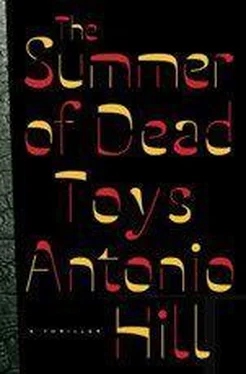Antonio Hill - The Summer of Dead Toys
Здесь есть возможность читать онлайн «Antonio Hill - The Summer of Dead Toys» весь текст электронной книги совершенно бесплатно (целиком полную версию без сокращений). В некоторых случаях можно слушать аудио, скачать через торрент в формате fb2 и присутствует краткое содержание. Жанр: Триллер, на английском языке. Описание произведения, (предисловие) а так же отзывы посетителей доступны на портале библиотеки ЛибКат.
- Название:The Summer of Dead Toys
- Автор:
- Жанр:
- Год:неизвестен
- ISBN:нет данных
- Рейтинг книги:4 / 5. Голосов: 1
-
Избранное:Добавить в избранное
- Отзывы:
-
Ваша оценка:
- 80
- 1
- 2
- 3
- 4
- 5
The Summer of Dead Toys: краткое содержание, описание и аннотация
Предлагаем к чтению аннотацию, описание, краткое содержание или предисловие (зависит от того, что написал сам автор книги «The Summer of Dead Toys»). Если вы не нашли необходимую информацию о книге — напишите в комментариях, мы постараемся отыскать её.
The Summer of Dead Toys — читать онлайн бесплатно полную книгу (весь текст) целиком
Ниже представлен текст книги, разбитый по страницам. Система сохранения места последней прочитанной страницы, позволяет с удобством читать онлайн бесплатно книгу «The Summer of Dead Toys», без необходимости каждый раз заново искать на чём Вы остановились. Поставьте закладку, и сможете в любой момент перейти на страницу, на которой закончили чтение.
Интервал:
Закладка:
A middle-aged woman with South American features accompanied them to the lounge. The contrast between the house they’d just visited and this one was so huge that even Héctor, for whom interior design was as abstract a discipline as quantum physics, couldn’t help noticing it. White walls and low furniture, a painting in warm tones and Bach smoothly wafting through the air. Regina Ballester had made it very clear that Glòria Vergès seemed rather dull to her, but the atmosphere she’d created in her house was one of harmony, of peace. The type of house that a man like Enric Castells wants to come home to: calm and beautiful, with large windows and bright spaces, not too modern or too classic, in which every detail exudes money and good taste. Without wanting to, he noticed that the table runner flaunted a black-and-white geometric pattern, which he recognized as one of Ruth’s designs. Maybe that was what made him feel a stab of sadness, rapidly mixing with an ill-at-ease feeling, a bitter pang he recognized as unfair. Someone had died there less than two weeks before, and yet the house seemed to have recovered completely: the tragedy had been neutralized, everything had gone back to normal.
“Inspector Salgado? My husband told me you were coming. He should be here any minute.” Héctor understood instantly why Glòria Vergès and Regina Ballester couldn’t move beyond a superficial friendship. “We should wait for him,” she added, with a note of uncertainty in her voice.
“Mama! Look!”
A little girl of four or five claimed Glòria’s attention and she didn’t hesitate in giving it to her immediately.
“It’s a castle!” announced the little one, waving a drawing in the air.
“Wow, the castle where the princess lives?” asked her mother.
Seated at a small yellow table, the little girl looked at the drawing and thought about the answer.
“Yes!” she exclaimed at last.
“Why don’t you draw the princess? Walking in the garden.”
Glòria had crouched down beside her and from there she came back toward Salgado and Castro. “Would you like something to drink?”
“If you don’t mind, we would prefer to go up to the attic,” said Salgado.
Glòria hesitated again: it was obvious her husband had given her precise instructions and she didn’t feel comfortable disobeying them. Luckily, at that moment someone entered the lounge. Salgado and Castro turned toward the door.
“Fèlix,” said Glòria, surprised but relieved. “This is my husband’s brother, Father Fèlix Castells.”
“Inspector.” The man, very tall and rather stout, extended his hand to greet them. “Enric just rang me: something has come up unexpectedly and he’ll be a little late. If you need anything in the meantime, I’ve come to be of use to you in any way I can.”
Before Héctor could say anything, Glòria approached them.
“I beg your pardon, would you mind talking somewhere else?” She gave a sidelong glance at the little girl. “Natàlia has had a very bad time recently; she’s had some appalling nightmares.” She exhaled. “I don’t know if it’s best, but I’m trying to bring everything back to normal,” she added, almost as an excuse. “I don’t want to remind her of it again.”
“Of course.” Fèlix looked at her affectionately. “Let’s go upstairs, shall we?”
“I’ll go up with you,” said Héctor. “Would you mind if Agent Castro had a look at Marc’s room?” He lowered his voice on saying the boy’s name, but even so the little girl turned toward them. Evidently she was following the conversation although she seemed absorbed in her drawing. How much of what was going on around them did children understand? It must be very difficult to explain a tragedy like this to a little girl of her age. Maybe her mother’s choice was the best: returning to normal, as if nothing had happened. That is, if that were even possible.
Enric Castells’ unwelcome thing that has come up unexpectedly is at this moment observing him from the other side of the table with a mixture of curiosity and scorn. It’s a tranquil bar, above all in summer, because the soft armchairs and tables of dark wood give off a feeling of heat that the air-conditioning can’t quite dispel. Waiters are dressed in uniforms of an oldfashioned formality, and a pair of old-timers sitting at the bar clearly spend every afternoon there since their health is the topic of conversation. And them, of course, sitting in the back, almost crouching, as if they are hiding from anyone who might come in by chance. On the table there are two cups of coffee with their respective saucers and a little white jug.
Seen from the other side of the glass, their gestures are those of a couple in crisis facing an imminent and unavoidable break-up. Although their words can’t be heard, there is something in the posture of the woman which suggests extreme tension: she spreads her arms and shakes her head, as if the man opposite her is disappointing her once again. He, for the most part, seems immune to anything the woman may say to him: he looks at her with irony, with an ill-concealed indifference. His rigid posture, however, contradicts this indifference. The scene continues thus for a few minutes. She insists, asks, demands, pulls out a piece of paper with something printed on it and throws it on the table; he looks away and answers in monosyllables. Until suddenly something she says makes its mark: it is immediately obvious in his darkened expression, in the fist he makes before clasping both hands, tense, on the table; in his manner of getting up, as if he’s no longer prepared to endure any more. She looks out of the window, pensive, turns to add something but he’s already gone. The piece of paper is still on the table. She picks it up, re-reads it. Then she folds it carefully and puts it back in her bag. She suppresses a bitter smile. And, as if doing so is a great effort, Joana Vidal gets up from her seat and walks slowly toward the door.
The word attic brings to mind sloping roofs, wooden rafters and old rocking chairs, forgotten toys and dusty chests: an intimate space, a refuge. The one in the Castells’ house must be the pasteurized version: spotless, with white walls, in perfect order. Héctor didn’t know how the room had looked when Marc was alive, but now, two weeks after his death, it was a perfect extension of the harmonious atmosphere of the floor below. Nothing old, nothing out of place, nothing personal. An empty table of pale wood, arranged at a right angle to the window to take advantage of the light; a modern, almost officelike chair; shelves full of books and CDs, slightly illuminated by the evening light coming through the window, situated at waist height. A large, impersonal room, nothing standing out. The only thing that evoked real attics was a large box leaning against the wall opposite the table.
Héctor went toward the only window, opened it and leaned out. He closed his eyes and tried to visualize the victim’s movements: seated on the windowsill, legs hanging, cigarette in hand. A little drunk, just enough for his reflexes to be less quick than usual, probably thinking about the girl awaiting him in his room, although, it seems, without too much enthusiasm for following her to bed. Maybe he is mustering up the courage to turn her down, or the reverse, taking in air to give her what she wants. It is his moment of peace: a few minutes in which he puts the world in order. And, when he finishes his cigarette, he puts one leg inside, intending to turn around. Then the alcohol has its effect; a momentary but fatal dizziness. He falls backward, his arms moving through space; the foot on the floor slips.
Fèlix Castells had stayed on the threshold, observing him in silence. Not until Héctor had moved away from the window again did he close the door and turn to him.
Читать дальшеИнтервал:
Закладка:
Похожие книги на «The Summer of Dead Toys»
Представляем Вашему вниманию похожие книги на «The Summer of Dead Toys» списком для выбора. Мы отобрали схожую по названию и смыслу литературу в надежде предоставить читателям больше вариантов отыскать новые, интересные, ещё непрочитанные произведения.
Обсуждение, отзывы о книге «The Summer of Dead Toys» и просто собственные мнения читателей. Оставьте ваши комментарии, напишите, что Вы думаете о произведении, его смысле или главных героях. Укажите что конкретно понравилось, а что нет, и почему Вы так считаете.












